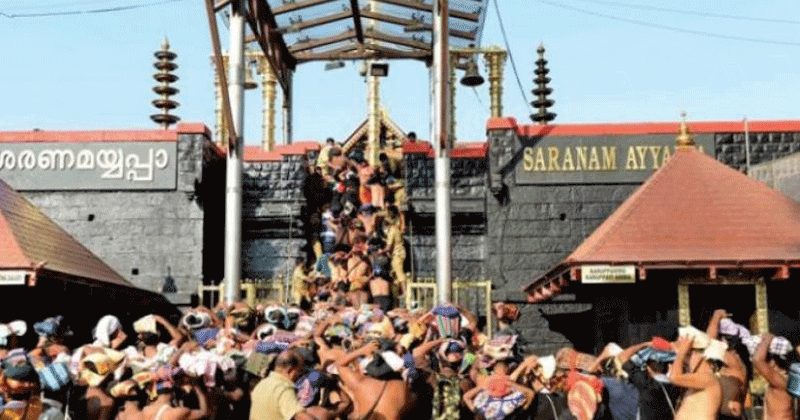
The Sabarimala case takes a new twist as the Court has been asked to weigh between God’s will in the matter and that of the Court.
The Sabarimala main priest had posed this question to the Supreme Court, asking the judges to weigh between ‘Devaprasnam’ (interpreting the will of the god) supporting the practice and the SC’s constitutional queries on women’s right to equality.
The bench had dissuaded the matter stating that: “We will go by the Constitution and its language. Once a temple is a public religious place, it cannot prohibit entry of women. We are dealing with the core issue of a class of women being denied on the ground of their physiological characteristics. After allowing entry, women must follow all rituals commanded by the religion or its denomination. But how can entry be stopped in a public place of worship?”
The main priest’s counsel countered that the believers go into the temple to pray to God, not to question the beliefs and customs that belong to the temple.
“Has any of the petitioners filed affidavits affirming their faith and belief in Lord Ayyappa? If not, how can they question its customs? Do they believe in idol worship and the core rituals of Ayyappa temple? Do they say they want to worship there? These are essential qualifications before one seeks equality,” said V Girir, the senior advocate appearing for the priest.
READ ALSO: Sabarimala temple row: Kerala Hindu outfits call for state-wide Harthal
Giri said the issue of permitting women of all ages into Sabarimala temple was subjected to ‘Devaprasnam’, a ritual performed by well-known astrologers to answer questions pertaining to religious practices and instances where the ‘thantris’ are unable to take a decision. “The results of such ‘Devaprasnams’ conducted in the past are documented which reveal that ‘deity does not wish young women entering the temple precincts’. ‘Devaprasnam’ holds a revered position in determining spiritual matters of temples in Kerala,” he said.
NOT ANOTHER AYODHYA
The Kshetra Samrakshana Samiti on Thursday urged the Supreme Court not to tinker with the age-old custom and religious practice and said allowing women in the age group of 10 to 50 to enter the Ayyappa temple “will lead to social tensions in Kerala”.
Senior counsel Kailasanatha Pillay, appearing for the Samiti made this submission before a five-judge Constitution Bench comprising the Chief Justice Dipak Misra and Justices Rohinton Nariman, A.M. Kanwilkar, D.Y. Chandrachud and Ms. Indu Malhotra hearing a batch of petitions challenging the ban on entry of women between the age of 10 and 50 into the temple. He said though members of the Samiti are peace loving people, yet “I don’t want another Ayodhya in Kerala”.
Earlier the CJI told the council, “If you say it is a public temple, then the custom and essential and practice must be integral to the religion; the question is how far the practice of exclusion of a certain category of women is valid. Your custom must stand the test of constitutional provisions.” The CJI said, “One can have rights to regulate rituals, but you cannot impose discriminatory conditions. “The court cannot be oblivious of the fact that one class of women is excluded on physiological grounds. Can there be a custom and integral religious practice, which excludes women, if so it is extremely arbitrary.”

Post Your Comments